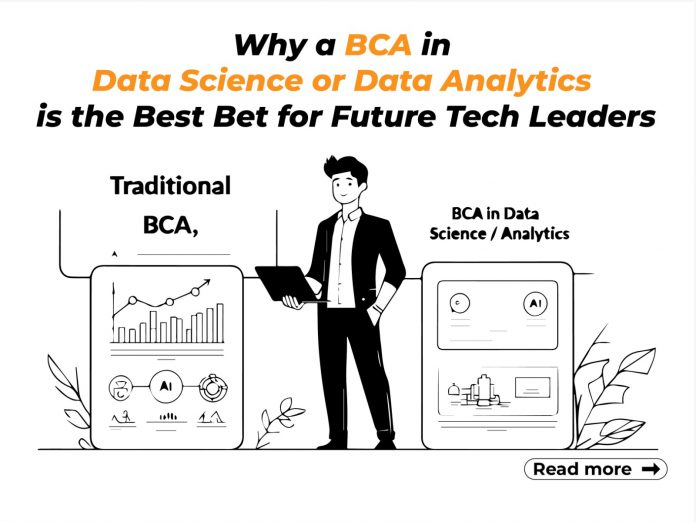Why is BCA in Data Science or Analytics your best bet?
In today’s rapidly evolving digital age, data has emerged as the most valuable asset. Businesses, governments, healthcare institutions, and even entertainment platforms now depend heavily on data-driven strategies. Today, companies need smart people who can collect and study data to make good choices.
That’s why jobs in data science and data analytics are growing fast. A course for future tech leaders like the BCA in Data Science or BCA in Data Analytics at Lovely Professional University (LPU) helps students learn the skills they need for big career success.
Understanding BCA in Data Science
The BCA in Data Science programme is designed to equip students with the knowledge and skills required to harness the power of data. This course blends computer applications with modern analytical techniques to address real-world challenges. This course focuses more on data analysis, machine learning, and business decision-making than a regular computer science degree.
The BCA Data Science syllabus typically includes core subjects such as:
- Python programming
- Data mining
- Machine learning
- Artificial intelligence
- Data structures and algorithms
- Database management systems
In addition, the BCA Data Science course details include exposure to tools like R, SQL, Tableau, and Hadoop, which are extensively used in the industry.
Eligibility for this course requires students to have completed their 10+2 education with mathematics as a compulsory subject. At LPU, admission is merit-based, with additional consideration for entrance tests conducted by the university.
Graduates from BCA data science colleges like LPU can explore diverse career paths. Job roles such as data scientist, AI engineer, data engineer, and business intelligence analyst are available across sectors like healthcare, e-commerce, finance, and logistics. These roles offer competitive salaries and clear growth trajectories.
Understanding BCA in Data Analytics
While data science focuses on the creation of algorithms and models, BCA in Data Analytics emphasises interpreting historical and current data to gain insights. It aims to equip students with the analytical skills necessary to support business decisions through meaningful data insights.
Key areas covered in the BCA in Data Analytics course include:
- Statistical analysis
- Data visualisation
- Predictive modelling
- Business analytics
- Operations research
- Excel and SQL
- Python for analytics
Students are also introduced to real-world datasets, helping them to build portfolios that reflect industry-relevant experience. The curriculum trains students to use tools such as Power BI, SAS, and advanced Excel, which are essential for analytical roles.
The BCA in Data Analytics eligibility criteria are similar to that of the Data Science course, with students needing a strong background in mathematics and logical reasoning. LPU offers this course with a project-based approach, ensuring students can solve business problems using data-driven methods.
Upon graduation, students can secure positions as data analysts, business analysts, market researchers, and financial modelers. Industries ranging from retail to fintech are actively recruiting professionals trained in analytical decision-making. Students from top BCA in Data Analytics colleges like LPU find themselves at an advantage when applying to these high-impact roles.
BCA in Data Science vs. BCA in Data Analytics: Key Differences
Although both courses fall under the data domain, their focus areas and technical skillsets differ significantly. A BCA in Data Science leans more towards programming, algorithm development, and automation, making it suitable for roles in AI and machine learning. On the other hand, a BCA in Data Analytics develops skills for interpreting existing data and presenting insights, making it ideal for roles in business intelligence and strategic planning.
Both fields are essential, but your choice should depend on whether your interest lies in building models or interpreting results.
Career Opportunities & Salary Expectations
Graduates from both courses can expect lucrative career opportunities. Job roles after completing a BCA in Data Science include:
- Data scientist
- Data engineer
- AI/ML engineer
- Research analyst
Salaries for these roles range between ₹5 to ₹12 LPA, depending on the industry and location.
Meanwhile, a BCA in Data Analytics graduate can pursue roles such as:
- Data analyst
- Business analyst
- Operations analyst
- Marketing data specialist
These roles offer starting packages of ₹4 to ₹10 LPA, with rapid growth in e-commerce, FMCG, and financial sectors.
As data continues to play a crucial role in business transformation, the demand for both skill sets will remain high. Companies increasingly seek professionals who can combine domain knowledge with technical expertise to influence business outcomes.
Future Trends in Data Science & Analytics
The future of data-centric careers is shaped by technological advancements and changing regulatory landscapes. AI and automation are already transforming industries by enabling faster, more accurate decision-making. As AI becomes more advanced, the need for professionals who understand its ethical implications and applications will grow.
Moreover, responsible data usage has become essential. Governments and organisations are establishing data governance frameworks to ensure privacy and transparency. Students trained in ethical data handling and regulatory compliance will find themselves in high demand.
Another rising trend is the integration of real-time data analytics in everyday business operations. The ability to analyse and act upon live data streams is becoming critical in fields like supply chain management, healthcare diagnostics, and fraud detection.
The development of low-code and no-code platforms is also democratising data science. This trend allows more professionals to engage with data, increasing the relevance and importance of foundational degrees like BCA in Data Science and BCA in Data Analytics.
Conclusion
The demand for data-driven professionals has never been greater. For students aspiring to become tech leaders, pursuing a BCA in Data Science or BCA in Data Analytics from a reputed university like Lovely Professional University (LPU) provides a future-ready foundation. These programmes offer a unique combination of technical knowledge, analytical skills, and industry exposure.
Choosing between these two courses depends on one’s career aspirations. If innovation through AI, machine learning, and algorithm design fascinates you, then a BCA Data Science path may be ideal. However, if business strategy, data interpretation, and analytical storytelling attract you, then a BCA in Data Analytics might be the better fit.
Both fields offer excellent career growth, competitive salaries, and opportunities across a wide range of industries. As the digital world expands, the need for skilled data professionals will only intensify. Begin your journey today with a course for future tech leaders at LPU, and take the first step towards becoming a data-driven leader of tomorrow.




![Career Paths After B.Sc. Information Technology [Lateral Entry] Career Paths after B.Sc. Information Technology [Lateral Entry]](https://www.lpu.in/blog/wp-content/uploads/2026/01/Career-Paths-after-B.Sc_.-Information-Technology-Lateral-Entry-218x150.png)








